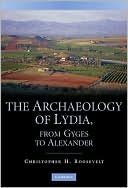 In The Archaeology of Lydia, From Gyges to Alexander, Christopher H. Roosevelt provides the first overview of the regional archaeology of Lydia in western Turkey, including much previously unpublished evidence and a fresh synthesis of the archaeology of Sardis, the ancient capital of the region. Combining data from regional surveys, stylistic analyses of artifacts in local museums, ancient texts, and environmental studies, he presents a new perspective on the archaeology of this area.
In The Archaeology of Lydia, From Gyges to Alexander, Christopher H. Roosevelt provides the first overview of the regional archaeology of Lydia in western Turkey, including much previously unpublished evidence and a fresh synthesis of the archaeology of Sardis, the ancient capital of the region. Combining data from regional surveys, stylistic analyses of artifacts in local museums, ancient texts, and environmental studies, he presents a new perspective on the archaeology of this area. To assess the importance of Lydian landscapes under Lydian and Achaemenid rule, roughly between the seventh and fourth centuries BCE, Roosevelt situates the archaeological evidence within frameworks established by evidence for ancient geography, environmental conditions, and resource availability and exploitation. Drawing on detailed and copiously illustrated evidence presented in a regionally organized catalogue, this book considers the significance of evidence of settlement and burial at Sardis and beyond for understanding Lydian society as a whole and the continuity of cultural traditions across the transition from Lydian to Achaemenid hegemony.
m